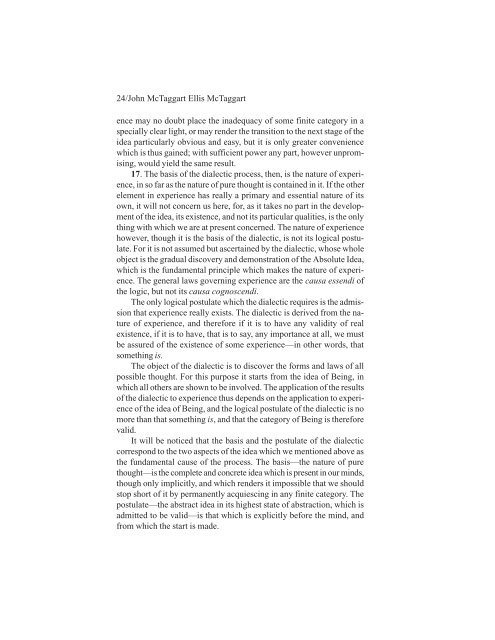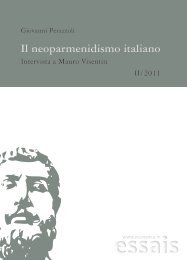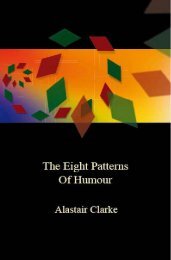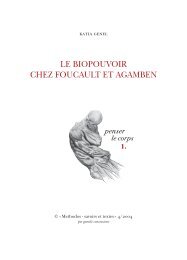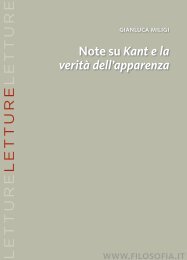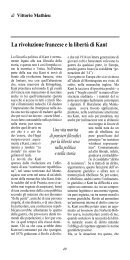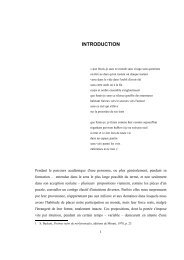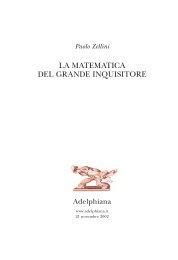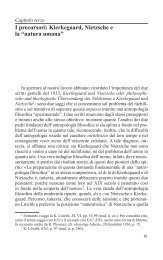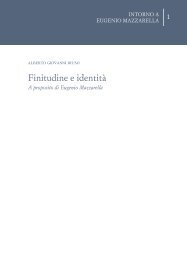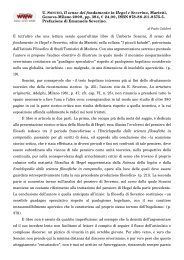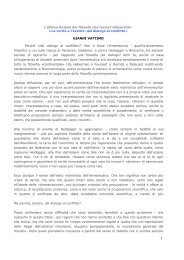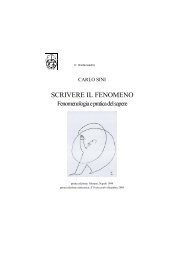McTaggart, Studies in the Hegelian Dialectic
McTaggart, Studies in the Hegelian Dialectic
McTaggart, Studies in the Hegelian Dialectic
Create successful ePaper yourself
Turn your PDF publications into a flip-book with our unique Google optimized e-Paper software.
24/John <strong>McTaggart</strong> Ellis <strong>McTaggart</strong><br />
ence may no doubt place <strong>the</strong> <strong>in</strong>adequacy of some f<strong>in</strong>ite category <strong>in</strong> a<br />
specially clear light, or may render <strong>the</strong> transition to <strong>the</strong> next stage of <strong>the</strong><br />
idea particularly obvious and easy, but it is only greater convenience<br />
which is thus ga<strong>in</strong>ed; with sufficient power any part, however unpromis<strong>in</strong>g,<br />
would yield <strong>the</strong> same result.<br />
17. The basis of <strong>the</strong> dialectic process, <strong>the</strong>n, is <strong>the</strong> nature of experience,<br />
<strong>in</strong> so far as <strong>the</strong> nature of pure thought is conta<strong>in</strong>ed <strong>in</strong> it. If <strong>the</strong> o<strong>the</strong>r<br />
element <strong>in</strong> experience has really a primary and essential nature of its<br />
own, it will not concern us here, for, as it takes no part <strong>in</strong> <strong>the</strong> development<br />
of <strong>the</strong> idea, its existence, and not its particular qualities, is <strong>the</strong> only<br />
th<strong>in</strong>g with which we are at present concerned. The nature of experience<br />
however, though it is <strong>the</strong> basis of <strong>the</strong> dialectic, is not its logical postulate.<br />
For it is not assumed but ascerta<strong>in</strong>ed by <strong>the</strong> dialectic, whose whole<br />
object is <strong>the</strong> gradual discovery and demonstration of <strong>the</strong> Absolute Idea,<br />
which is <strong>the</strong> fundamental pr<strong>in</strong>ciple which makes <strong>the</strong> nature of experience.<br />
The general laws govern<strong>in</strong>g experience are <strong>the</strong> causa essendi of<br />
<strong>the</strong> logic, but not its causa cognoscendi.<br />
The only logical postulate which <strong>the</strong> dialectic requires is <strong>the</strong> admission<br />
that experience really exists. The dialectic is derived from <strong>the</strong> nature<br />
of experience, and <strong>the</strong>refore if it is to have any validity of real<br />
existence, if it is to have, that is to say, any importance at all, we must<br />
be assured of <strong>the</strong> existence of some experience—<strong>in</strong> o<strong>the</strong>r words, that<br />
someth<strong>in</strong>g is.<br />
The object of <strong>the</strong> dialectic is to discover <strong>the</strong> forms and laws of all<br />
possible thought. For this purpose it starts from <strong>the</strong> idea of Be<strong>in</strong>g, <strong>in</strong><br />
which all o<strong>the</strong>rs are shown to be <strong>in</strong>volved. The application of <strong>the</strong> results<br />
of <strong>the</strong> dialectic to experience thus depends on <strong>the</strong> application to experience<br />
of <strong>the</strong> idea of Be<strong>in</strong>g, and <strong>the</strong> logical postulate of <strong>the</strong> dialectic is no<br />
more than that someth<strong>in</strong>g is, and that <strong>the</strong> category of Be<strong>in</strong>g is <strong>the</strong>refore<br />
valid.<br />
It will be noticed that <strong>the</strong> basis and <strong>the</strong> postulate of <strong>the</strong> dialectic<br />
correspond to <strong>the</strong> two aspects of <strong>the</strong> idea which we mentioned above as<br />
<strong>the</strong> fundamental cause of <strong>the</strong> process. The basis—<strong>the</strong> nature of pure<br />
thought—is <strong>the</strong> complete and concrete idea which is present <strong>in</strong> our m<strong>in</strong>ds,<br />
though only implicitly, and which renders it impossible that we should<br />
stop short of it by permanently acquiesc<strong>in</strong>g <strong>in</strong> any f<strong>in</strong>ite category. The<br />
postulate—<strong>the</strong> abstract idea <strong>in</strong> its highest state of abstraction, which is<br />
admitted to be valid—is that which is explicitly before <strong>the</strong> m<strong>in</strong>d, and<br />
from which <strong>the</strong> start is made.


